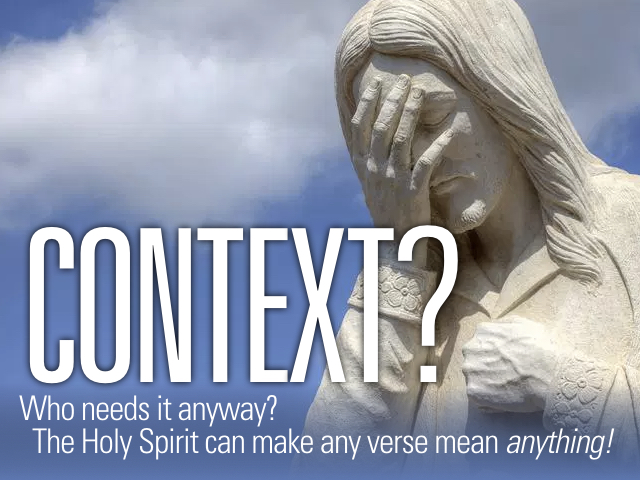
Matthew 1.18-21.
The idea of Jesus’s mother Mary being a virgin when she gave birth him, doesn’t work for a lot of people nowadays. “She was a virgin? Yeah right. She totally had sex with somebody. And then lied about it, and said God did it, and that sucker Joseph believed her.”
Clearly they’ve not read the gospels, because Joseph absolutely didn’t believe her.
- Matthew 1.18-19 KWL
- 18The genesis of King Jesus is like this:
- His mother Mary, betrothed to Joseph,
- before coming to live together,
- is found to be pregnant
- through the Holy Spirit.
- 19 Her man Joseph, a right-minded man,
- not wanting to make a show of her,
- intends to privately release her.
Joseph knew you can’t just “be pregnant through the Holy Spirit.” He knew how babies are made. He lived in a farming community. Livestock everywhere… some of ’em making babies right in front of everyone. Who didn’t know how babies were made?
Greek myths abound of stories in which Zeus disguised himself so he could have sex with Greek women, and thereby produce ἡμίθεοι/imítheï, “demigods”—half-human, half-god spawn. Myths used Zeus’s out-of-control sex addiction to explain the origin of the more famous Greek heroes, like Herakles, Theseus, Achilles, Perseus, Orpheus… and in the present day, Wonder Woman. But it’s more than likely all the women who contributed to the story of a horny god assaulting various noblewomen in the Greek Empire, had simply had sex with somebody, and blamed Zeus rather than suffer the usual consequences of unchastity.
Thing is, once you read the myths, you’ll notice whenever women claimed Zeus impregnated them, typically the Greeks didn’t believe ’em either. They punished their wives and daughters as if Zeus—the mightiest being they could imagine, a terrifying person to get on the wrong side of—had nothing to do with their pregnancies. Banished ’em, imprisoned ’em, sealed ’em in a coffin and threw them into the sea. (Then, say the myths, Zeus smote them for their unbelief.) The ancients knew exactly how babies are made. The “Zeus did it!” story didn’t work. Nor should it!
And the “God did it” story didn’t work on Joseph either. To his mind, Mary clearly had sex—and not with him. And she was trying to blame the Holy Spirit, of all people. The Spirit doesn’t do that; he’s not Zeus! He’s not gonna transform himself into bulls and geese so he can rape silly teenage girls. The very idea is the most ridiculous, offensive sort of blasphemy.
Mary’s apparent infidelity and outrageous excuse aside, Joseph was what Matthew calls δίκαιος/díkeos, which the KJV translates “just” and the NIV “was faithful to the law.” It means as I translated it: Right-minded. Joseph was the type of person who always sought to do the moral thing. He didn’t wanna be vengeful, and expose Mary to public ridicule. He simply wanted their relationship to be done, so he could move on and marry someone who’d stay true to him.
Betrothals among first-century Israelis were a contractual agreement between the husband and wife’s families. (The husband would provide this, the wife that.) But all it took to end these agreements, was simply for the husband to declare, “I divorce you” three times, and bam, the contract was null. The husband would forfeit his dowry (unless there was fraud involved in the marriage), the wife would go back to her parents’ house, and that was that. So Joseph figured he’d do that. Not in the town square, to publicly embarrass her. Just in front of their parents. That’s what Matthew means by “privately.”
So yeah, let’s put aside this idea the ancients were naïve idiots who’d believe ridiculous stories. Not even the pagans did. Devout Israelis knew God isn’t at all like that, and Joseph didn’t believe the virgin-conception story any more than any of today’s skeptics would.
But something flipped Joseph 180 degrees—so much so that he legally adopted Mary’s kid and raised him as his own. This something was a prophetic dream. And from what we know about prophetic dreams, it wouldn’t have worked on Joseph unless
- he was stupid, or
- he had multiple experiences with prophetic dreams, and his experiences showed him they were reliable.
Me, I’m pretty sure it’s that second thing.







